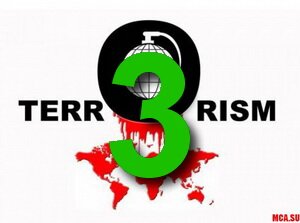
Part 3: The Implicit Threat
According to Europol's annual report on the dynamics of terrorist movements, today France is a leader in Europe in the number of activists who practice radical Islam. “The terrorist threat to the European Union remains serious and diversified”, — reads the report of the Police service of the EU.
In total, during 2013, in the European Union were arrested 216 people on suspicion of involvement in Islamist underground. Approximately two-thirds were detained in France. It is noteworthy that during the year the frequency of detection of dangerous Islamist elements in France doubled. For example, in 2012 authorities of the French Republic arrested only 91 people on suspicion of terrorism.
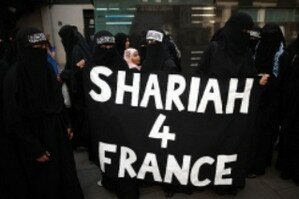 |
|
Islamists in France Photo http://www.dal.by/ |
In general, among Western European countries, France has been historically most closely associated with Islam. Back in 732, Charles Martel managed to stop the advance of the Arabs at Poitiers, but that did not prevent settling of the Moors along the Mediterranean coast in the 8th -9th centuries.
In the 11th–13th centuries, France was at the head of the Crusades of European monarchs to protect the Holy Sepulcher, and from the 15th to the 18th century, with varying success it had been fighting for the control over the Mediterranean.
On the eve of the First World War, about 30.000 immigrants from North Africa lived in France. The war led to the mass use of African Muslims at the front and in the rear (over 300 thousand people). Isolated from their usual socio-cultural environment, Muslim immigrants did not observe their own religious practices too strictly. Suffice it to note that the first prayer rooms for Muslims were opened on the initiative of host employers to maintain a proper moral climate in the workplace. Moreover, for the salvation of morality and ethics in the country, were invited imams and talaba (spiritual leaders) of various Sufi brotherhoods, in railway depots and hospitals appeared Muslim prayer rooms; were created first large Muslim cemeteries.
After the Second World War, reconstruction and industrial growth contributed to labor immigration of Muslims. The Muslim population of the metropolis was replenished mainly by Algerian immigrants.
Rapid Islamization of France was due to its liberal legislation: until 1993 the children of immigrants born in France, could automatically apply for citizenship. In 1993, the law was tightened. It is on the example of this most Muslim country in Europe, that we can especially clearly see the high degree of influence of foreign policy context on the course of adaptation of migrants. Since 1970s, the development of Muslim communities in France can be divided into six stages, coinciding with a change of the religious climate in the international arena.
The first stage covers the period from the early 1970s to mid-1970s, when Islamic groups were making their first steps. Muslims living in the country were showing no desire for religious self-assertion. Economic migrants — due to realizing impermanence of their staying in the country; French Muslims — because they saw giving up their Islamic identity as the key to successful integration into their host society in.
The second stage begins with the economic crisis of 1973. The decline in production that followed, made the government take the decision to stop importation of foreign labor force to France. Authorities' intention to stop the flow of economic immigration had led to the opposite result: the number of migrants, including Muslims, had increased by half. Fearing to lose the ability to return, temporary workers remained in the country. This gave rise to a rather serious problem of reunification of immigrants with their families. The refusal of the French government to give them such an opportunity, caused protests of a number of influential organizations, and in 1976, the authorities were forced to make concessions.
The third stage fell on 1970-1980's. During this period, the Muslim question becomes Europe's internal affair. By the results of the 1979 Islamic revolution in Iran, Muslims in Europe fell under the influence of radical Islam in its Sunni form (the Muslim Brotherhood and groups close to it) and in the form of Khomeini (Iranian-Shiite) revolutionarism.
The fourth stage — the 1980s — may be called the period of progressive “Frenchifying of Islam”. Descendants of Harki and Bera-born in France Maghreb immigrants' children more and more often say they are Muslims. Many of them see their return to Islam as compensation for the inability to integrate into the French society. Thanks to sermons of Jama'at al-Tabligh, at least 30 thousand native French people have embraced Islam.
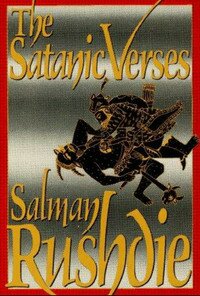 |
| “The Satanic Verses” |
The fifth stage took place in the late 1980s and led to the transformation of Islam into the second religion of France. In the country was formed a developed Islamic infrastructure in the form of mosques, religious associations, Islamic butcher shops and bookstores, Muslim cemeteries, etc. At the same time among French Muslims, there was a surge of Islamic fundamentalism, triggered by the military coup in Algeria and the ban on the activity of the Islamic Salvation Front. France faced the question of the status of Islam in the state, committed to the traditions of secularism.
In media was loudly discussed the case of the headscarf (the incident with the non-admission to the lessons of two students of a public school who came to the lessons in Muslim headscarves) and publication by Ayatollah Khomeini of the fatwa against the British writer Salman Rushdie, the author of the controversial book “Satanic Verses”
Since the mid-1990s began the current sixth stage associated with an increase in manifestations of religious extremism. In 1994-1996 in France took place a number of terrorist attacks, organized by Islamic radicals. Hostility of the French public opinion against Islam in general increased. In an effort to reduce the intensity of emotions, the rector of the mosque in Stalingrad Square in Paris Larbi Keshat in February 1997 addressed the French and Muslims calling for understanding, but it led only to a bomb attack at his temple.
As the well-known French Islamic scholar Olivier Roy points out, sociological portraits of performers of such attacks are of the same type. Terrorists are descendants of Muslim immigrants in the second generation, who grew up in disadvantaged areas, French speaking, with poor religious education, they did graduate from school, but were unable to make any successful professional career. Ethnicity for them is less important than the feeling of their own social marginality.
At the present stage the disparate communities of Muslims in France are centered around the following organizations: the Cathedral Mosque of Paris, the National Federation of Muslims of France, the Federation of Islamic Organizations, the Center of relations Islam–West, the Branch of the World Islamic Unity, branches of the Islamic Aid, the Union of Islamic Organizations of France.
The first European country to recognize in 1974 Islam as one of the official religions became the Kingdom of Belgium.
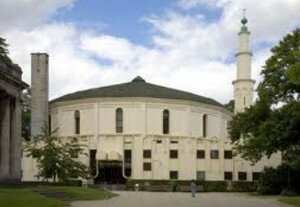 |
|
The oldest mosque in Belgium and residence of the Islamic Center Photo http://right-world.net/ |
Just around the corner from the building of the European Council was built the Islamic Center, within the walls of which operates a Muslim school, funded by the Ministry of Education. Teaching of fundamentals of Islam is part of the school curriculum for Muslim students in public schools.
Nonetheless, Imams, unlike the clergy of other recognized religious confessions, still do not receive financial support from the state. In January 2005, the Flemish authorities issued an order according to which the right to public funding have only those mosques, whose activity meets a number of criteria, including the mandatory use of the Dutch language outside the framework of service, tolerance for women and homosexuals, no appeals to extremism.
Despite the fact that Belgium has more than 350 mosques, in the institutions of civil society Muslims are not represented, they also do not have their own human rights organizations. The first elections to the representative body — the Supreme Council of Muslims of Belgium — took place in December 1998.
In the last decade, some progress has been made in the field of political representation of Muslims: according to the results of the 2003 elections, six Muslims became members of the national Parliament, one — of the European Parliament. They are present in all Ministries, municipalities and legislatures of the country. However, these representatives of the Islamic world cannot be considered spokesmen for views of all Muslims in Belgium, due to the latter's dissociation. “Bounty are black on the outside, white inside” — as followers of radical Islam speak of their more successful and politically moderate co-religionists.
The vast majority of Muslims in Belgium are of Moroccan or Turkish origin. The country has the dubious record for the largest number of converts to Islam among all the states of Europe.
In 2006, after the ethnic Belgian Marian Dikuk who converted to Islam, had become the first representative of the Old Continent, to commit an act of self-sacrifice in Iraq, having undermined a few American soldiers, the problem of countering Islamist propaganda entered the list of the most relevant topics of the Belgian media.
The presence of several official languages, preventing resettlement of Muslims on the basis of the ghetto principle with formation of closed quarters, more or less successfully contribute to the integration of Muslim communities into the Belgian society. Nevertheless, the overall level of intolerance to non-ethnic population remains high. According to the Belgian non-governmental Center for provision of equal opportunities and struggle against racism, in 2003 they received more than 2.5 thousand complaints of racial discrimination. It also should be noted that in the practical regulation of citizenship, Belgium's legislation focuses on the right of blood — jus sanguinis, according to which the basis for granting of citizenship is the origin.
Currently, Islamist organizations slowly but persistently continue to struggle for Islamization of the Belgian society. Thus, a member of “Sharia for Belgium” promises that, when Sharia laws are established, the Belgian will have to make room, and then to get out of the country.
Another activist of the Belgian cell said before the TV camera:
“We will never stop. We are not afraid of jail, nor even of death itself, because we are ready to die Shahids!”
What have to do indigenous Belgians who do not want to change the faith of their fathers?
Up to the bombings in London July 7, 2005 one of the most trustworthy was considered the Muslim community of Great Britain.
The history of Muslims' presence in the British Isles has three centuries and is most closely associated with the activities of the East India Company. From the middle of the 19th century, especially after opening in 1869 of the Suez Canal, Muslims, mainly ship owners and traders from Arab countries (Yemen and Somalia) and British India, began to settle compactly on the coast — in London, Liverpool, Bristol and Cardiff. At the same time in England, there appeared the first Muslim mystic and Sufi movements.
But the most mass Muslim migration to the metropolis began after the Second World War, first from India, then from the Western and Eastern (now Bangladesh), Pakistan. In 1960s Islamic immigration in Britain reached its peak and demanded from the government to adopt the three Immigration Acts, which restricted the entry of Muslims into the country.
In 1970-1980s the number of immigrants from the Muslim East in Great Britain was growing mainly due to the high birth rate of the first generation of migrants. At the present stage in Birmingham, Manchester, Nottingham, Liverpool, Cardiff, there are entire Muslim areas. The majority of their residents work as garbage collectors, porters, clerks and traders. According to a special Commission for Racial Equality, which for 28 years have been monitoring the policies of employers in relation to ethnic minorities, in recent years the gap between their salaries as compared with indigenous British people have been significantly reduced.
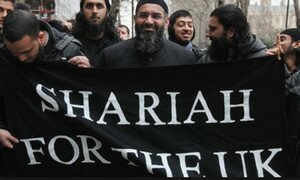 |
|
Every tenth of a British citizen at the age of 25 years is a Muslim Photo http://tbn-tv.ru/ |
However, discrimination in employment has remained at the same level. For example, for a white university graduate probability of getting a job at a large British company is three times higher than for a representative of the diaspora. The British of African-Caribbean origin four times more often than indigenous Brits with the same qualifications are not interviewed for employment. At this, the law provides for the right to challenge discriminatory attitudes only to those who has got a job.
For Muslim migrants the situation is even more complicated. Illustrative is the following case. Shortly after the events of 1990-1991's in the Persian Gulf, one British company in Sheffield in recruitment announced that it would not give employment to Muslims. The initiated against the company trial on charges of violating the law of 1968 on the equality of races was useless, because Muslims are not a separate race. But more likely seems restoration of the former system of hidden inequality at a new level by the rules of “Animal Farm” by George Orwell: all are equal but some are more equal than others.
In the meantime, representatives of communities more actively explore the sphere of small and medium-sized businesses. According to international studies, the ethnic economy of Great Britain is about 250 thousand firms and 13 billion US dollars into the public purse annually. In early 2006, the heir to the British Crown Prince Charles signed a Memorandum of understanding between the Islamic Development Bank (IDB) and a private charitable organization Youth Business International. At the conference held in London on the occasion of the thirtieth anniversary of the IDB, he expressed confidence that “with the support of the Islamic Development Bank, our charities will be able to intensify their efforts to address the problems we face in the cities of Britain, and to provide assistance to young Muslims who do not have sufficient support of the society, in order to participate equally in the life of the country, contributing to the strengthening of solidarity and development of joint business activities”. Creating funds, like the Youth Business International, whose activities are not limited to the UK alone, but extend to Morocco, Egypt and Jordan, the government aims to establish channels of indirect influence on the community members in order to more successfully control their activities in the future. The main difficulty in establishing a dialogue with Muslim communities is that moderate Muslims of Great Britain are not highly organized.
Meanwhile, the radical followers of Islam are not only united around the nearest mosque and its imam, but in one way or another support various pro-Islamic non-governmental organizations, in particular the Islamic Cultural Center, Association Muslim support in London, Islamic Relief Association in Birmingham. The latter is headed by Ghani Al-Bani, whose father was executed for his participation in the assassination attempt on Egyptian President Gamal Abdel Nasser. According to media reports, Islamic Relief is controlled and funded by the intelligence services of Great Britain and Saudi Arabia, and Al-Bani in September 1997 illegally traveled to Chechnya and met there with Aslan Maskhadov.
Even more active are: Federation of Student Islamic Societies, the Union of Muslim organizations of the United Kingdom and Europe, the Islamic Council of Europe, the Union of Islamic media, young Muslims Organization of the United Kingdom, and finally, the Islamic Mission of the United Kingdom. Established in 1962 under the strong influence of Jamaat-e-Islami, the Islamic mission aims at the spread of Islam through the establishment of friendly relations between Muslims and non-Muslims. Its centers at major mosques lead aggressive policy of proselytism among young people, spreading the newspaper Young Muslim.
To coordinate the activities of all these organizations, in 1990 was created the Islamic Society of Britain, which has its offices through the country. About a dozen mosques in Great Britain are controlled by the movement of Ahl-i Hadith, maintaining close, including financial, ties with the Muslims of South Africa.
The position of the Libyan Islamic Call Society is expressed by relatively non-influential, but permanently working in the country branches of the Muslim World League. The already mentioned Jamaat-e-Islami prefers to act economically and ideologically through the Islamic Foundation: in the field of education — through the Muslim Education Trust, in the sphere of propaganda of Islam — through the organization Da'waat-ul-Islam.
Presence in the country of a significant number of well-organized radical Muslim groups cannot help influencing the internal politics of Great Britain, especially in light of the fact that Muslims themselves at the turn of 1980-1990 had taken purely political steps.
In July 1989 in order to obtain seats in the parliamentary elections, they created the Islamic Party of Britain (IPB). In 1990 and 1992, the Party's efforts were unsuccessful, but later they won one seat. By 2001, in the British Parliament there were four Muslims: three members of the House of Lords and one member of the House of Commons. According to the statement of Lord-Muslim Nazir Ahmad, in February 2001, in local parliamentary structures of Great Britain had been working 160 Muslims. Nevertheless, as long as the basis of the system of parliamentary elections in the UK is the majority principle, Muslims will have no chance for the representation in Parliament corresponding to their ambitions. In none of the electoral wards they form the majority; besides their sympathies are divided about equally between the Conservatives and Labourists, which weakens their positions. It is also unlikely that the program slogan from the official website of the IPB — “Towards a better future with Islam” — could bring indigenous Brits to the side of the Party.
But the Islamists do not give up. London Islamist leader Sheikh Andzhima Khoudary, told the “Palestinian” reporter that for his people September 11 is like the beginning of the revival. In the Islamic center in Luton a young Muslim states: “Islam is now everywhere! We are actively working around the clock to create a worldwide caliphate. And we will win!” As they say, no comment!
It is obvious that there is no single explanation for the emergence of Islamic extremism in Europe, but we can try to identify some characteristic facts:
-
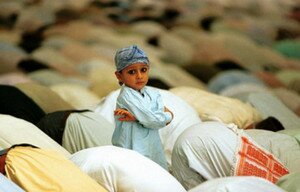 Segregation and racism lead to formation of Muslims' self-perception that they are excluded from the society in which they live;
Segregation and racism lead to formation of Muslims' self-perception that they are excluded from the society in which they live; - Some “Muslim customs” (e.g. polygamy, many restrictions or high birth rates) make stronger rejection of the Muslim community by the European society:
- the economic and social crisis hardest affected Muslim communities. While the average unemployment rate in France or Belgium is about 10%, for Muslim communities the usual figure is 20%, and sometimes even 40% among the Muslim youth, who represents the third generation. This strengthens the feeling of being excluded from the society;
- Democracy, globalization and the level of development of communications give people in Europe direct access to information. As a result, the events in Bosnia, Somalia, Chechnya, or the Israeli-Palestinian conflict make some young Muslims, to create what the French sociologist Farid Hosrohovar called “identity of the mediated insult”;
- Muslims, feeling outcast in the country in which they live, develop a kind of compassion for all “Muslim victims in the world” and convince themselves that their own exclusion and “persecution” of their brothers have the same roots: rejection of Islam by the Western world;
- The majority of Muslim clerics, even those who are not radical Islamists, come from abroad and are often trained in Saudi Arabia or by Saudi muftis. They have no real knowledge of the society in which their followers live, and as shown by studies in France and the Netherlands, they do not speak the local language. Thus, they cannot play a significant role in reducing tensions or help in integration;
- Many European Muslims do not recognize these clerics, accusing them of preaching “Islam of the rich” and prefer informal mosques. But this is a bad solution: in what we call “Islam of cellars and garages” (because of the places where these informal communities are found) clerics are mostly self-appointed. Their knowledge of the religion is extremely doubtful;
- In all countries where there are radical clerics, they take advantage of the above-mentioned facts, to defend radical Islam and to attack Western values, or European and American politics, which they portray as anti-Islamic and pro-Zionist;
- At European universities are active cells of Islamist radical terrorist movements and organizations, such as the “Muslim Brotherhood”, “Hezbollah”, “Hamas” or Algerian, Moroccan, Tunisian and Turkish groups;
- Some of the existing Islamist groups were created out of solidarity with the “persecuted Muslims” in Afghanistan, Algeria, Bosnia, etc. In most cases, these movements were not created spontaneously, but were formed and managed by organizations covering the “Muslim Brotherhood”;
- The latest generation of European Islam was born with the beginning of the war in Iraq in 2003. This very young, aggressive and cruel generation is beginning to more and more often appear in court requests for terrorist attacks.
Thus, the very heterogeneous, but in general loyal to Western values Muslim group which had existed in Europe for decades, is being rapidly eroded.
On the one hand, European governments are putting pressure on loyal Muslim communities, causing irritation and actually putting a choice: either to get closer to those who do not accept cooperation with European authorities that is to reject not only European but also the Islamic values. Either to agree to the “post-modern” version of Islam offered by the American Rand Corporation, which implies, in fact, the rejection of Islam as such.
On the other hand, European authorities do not take effective measures to struggle against the Islamists who refuse even to simulate loyalty. So meeting no opposition from European governments, the radical wing of the same “Muslim Brotherhood” keeps getting stronger. For example, the French “Association of Islamic Students in France”, with a reputation for moderate organization, has almost no followers, while the “Union of Islamic communities in France” is one of the most influential organizations in France.
Islamists in Europe, in fact, have all possibilities to attract people: they are engaged in charity and educational work. They also have full freedom to seek coming to power by democratic methods. But this is not enough. European governments turn a blind eye to the “moderate” Islamists' supporting terrorist organizations and actually encourage subversive activities against secular governments of Muslim countries. Such policy can result only in two scenarios:
The first — a peaceful rise to power of radical Islamists in Middle Eastern countries and further development of the situation on the Iranian way.
The second scenario — a civil war caused by the reluctance of secular authorities to let the Islamists to power.
To be continued

